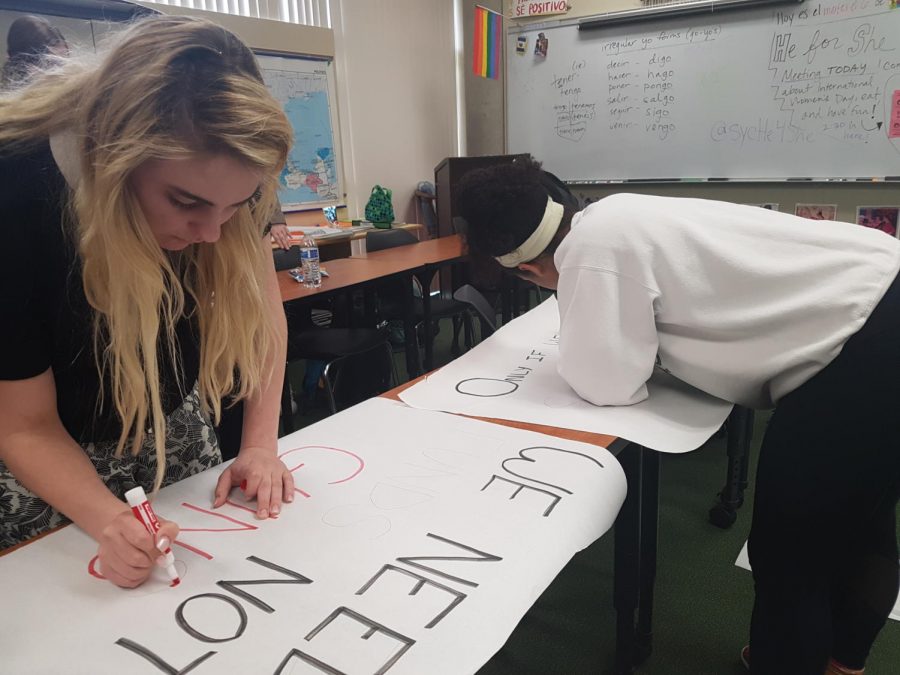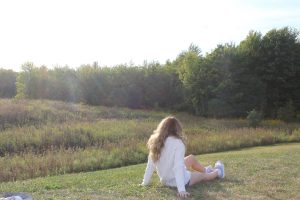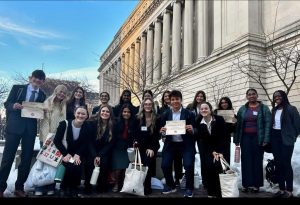When students speak up
How student activism impacts SHS, Cincinnati
FIGHT. Juniors Allison Landrum and Karissa Grandin create posters for the school walkout. A group of seniors organized the school-wide walkout to protest the gun violence in the United States. It took place on March 14 and featured student and staff speakers.
March 20, 2018
Activism, a result of students’ unwillingness to sit at the sidelines, is a way for them to become active agents of their own future. Now there has been a new wave of student protests in regard to gun violence.
“I think it is important for students to get involved in causes they believe in because sitting on the couch and doing nothing does not do anything for this world. So getting out there and acting on your feelings is a great way to promote humanity and to meet other people who share the similar opinions as you,” said Kate Willis, 12.
For Rasleen Krupp, a junior at Wyoming High School, activism has been become a part of her high school experience. Krupp is the founder of the Young Feminist Coalition and is planning the March for Our Lives on March 24.
“In Cincinnati, I am incredibly fortunate to have a group of mentors who guide me in my activism. They inspire me and show me how to create the change I want to see. My first rally/march was downtown with one of my mentors, advocating for DACA. After that, I was hooked.
“I delivered a speech at the women’s march, and that’s when I realized that the Young Feminists Coalition was something that I wanted to develop further. We now are engaged in a multitude of events, including the International Women’s Day Celebration and the March For Our Lives,” Krupp said.
Student activism has been a part of the fabric of this country for years; from the lunch counter sit-ins of the 1960s and the Vietnam War protests to modern Civil Rights movements, students have played an integral part in bringing the voice of young people out from the woodwork.
“Student activism was important in the past, and it’s important now. Young people around the world have helped create so much positive change. Civil rights, for example, involved a large amount of students. As inhabitants of this world, we have the right, and the duty, to improve our home.
“The best advocates for students’ interests are students. We need to fight for what we believe in and show that we are capable of creating the change we want to see in the world,” Krupp said.
At SHS, there are a multitude of various clubs and groups from across the political spectrum to get involved in.
High schoolers, in particular, are at the crossroads of childhood and adulthood. Seniors become of age to vote, and it becomes imperative for them to actively participate in the world around them and to perform their civic duty.
“We are the future adults of the country, and if we want to see something happen, we are at the stage now where we can initiate change. So I think we should strive to make as much of a difference as we can,” said Abhilash Yarlagadda, 11.
Not only does activism make way for change and progress, it also impacts a generation’s perception on the world around them and gives insight on how they will change it.
“I have gained the sense that I can create change. Often, as young people, we are led to believe that our voices and votes don’t matter. That is incredibly false. Our voices advocate for ourselves.
“Our votes contribute to greater change within our governments. Nothing will stop the young people from using their voices and votes to change the world for the better,” Krupp said.
The March For Our Lives will take place on Sat., March 24 at City Hall.
Q&A with Rasleen Krupp, organizer of March for Our Lives
What sort of impact do you want to create with your events?
I want to encourage and inspire other young people to get involved. Often, we think that local government, or even federal, doesn’t concern us. Even if we find one thing to be really fired up about, our passion often diminishes as time goes on. Change takes a long time, but the fight must continue. If the suffragettes had given up after a month, women wouldn’t have the right to vote. When something needs to be changed, you must continue to fight for it however long the fight lasts.
What do you hope students (particularly high school students) take away from these marches?
I hope that they take the fire they feel inside when at these demonstrations back to their hometowns. I hope they unite with other young people in their neighborhoods to work together to create change. I hope that their passion for change doesn’t end at the march but continues into the rest of their lives.
What are some ways students can get involved?
There are incredible opportunities for students to get involved. They can join the Young Feminists Coalition, which is a group of young people, male and female, who work to create change in the local area. They can join the volunteer team for the March For Our Lives. To put it simply, they can advocate for causes they believe in in a number of ways, whether it be through voice, vote, or action.
When should students start thinking about politics and voting (i.e. only senior year or earlier)?
Definitely earlier! I began getting really involved in politics and activism this year (I’m a junior), but I think it’s important to know what’s going on around you much earlier. The more you know, the more informed of a voter you can be. And remember, if you are 17 but will be 18 by Election Day, you can register and vote in the primaries!
What drove you to start the Young Feminists Coalition and get involved in these events and marches around Cincinnati?
After the recent presidential election, I have to admit that I was very upset. I saw a lot of things that I thought were wrong but didn’t know how to change them. I began by volunteering for local political campaigns, and through them, I met some of my mentors. One woman, Kate Gallion, is a leader of the Cincinnati Women’s March. She knew how passionate I was about women’s rights and gave me the idea of uniting feminists from the local area. I don’t think that the coalition really started until I gave a speech at the Women’s March, though.
Can you tell us about other events that you have you gone to (even outside of Cincinnati) that have impacted you and/or prepared you for organizing marches?
The Women’s March is definitely an event that impacted me. I wasn’t super involved in the planning, but I was given the opportunity to give a speech. Being there with so many like-minded people was an incredible experience. That event definitely showed me that there are people who are as passionate about feminism as I am, and made me realize that I wanted to unite them to create change.
How do you think current events have fueled these marches?
This entire march is being created by the victims of the Parkland shooting. They realized that the current politicians and legislation are not working. They also realized that adults have failed, and now it’s the students’/young people’s time to create the change. I think that the activism of the victims is definitely what has made this issue so prevalent once again. The children at Sandy Hook could not advocate for themselves, and so, unfortunately, very little change was created. However, the Parkland victims are older and will use their voices to advocate for themselves. And we will advocate for them as well.
Who are some people that inspire you?
My mentors in Cincinnati definitely inspire me: Debbie Smith Webster, Billie Mays, Marguerite Boeckmann, and many others who have guided me in this fight. But on a more general level, I look up to women who run for office. I want to run one day and am inspired by women who take the plunge and run.
What message do you have for high schoolers in regard to getting involved?
My message is to find something you are passionate about and dive in. Don’t worry about when you’ll reach your goals; just start. Find like-minded people and work with them. Join an existing organization, or create your own!







